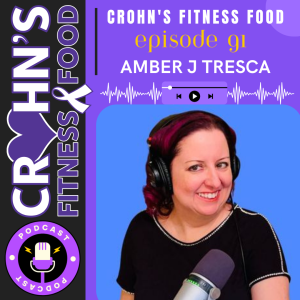
Friday Dec 15, 2023
Amber J Tresca: Writer, Advocate & Host of the About IBD podcast (E91)
Enjoy this interview with Amber J Tresca, health content creator, writer, speaker, advocate, and host of the About IBD podcast.
Amber was diagnosed with ulcerative colitis at the age of 16, had a colectomy at age 26, and started writing about inflammatory bowel disease (IBD) and other health conditions one year later! She’s been writing ever since, sharing both about her own journey and writing for a variety of health publications giving insight and technical information about IBD.
In this podcast episode, she share’s her story, perspective, and tips for fellow IBD patients.
From the show:
SG: How important it is to get care, and the right care, right away?
AT: …it’s so important. And it's important also to not get into that fatalistic state of mind that I was in, that I still don't know where it came from, but that I could only expect so much improvement and that it wasn't going to go further than that. I should have expected, I should have demanded more, but I didn't know what I didn't know.
Today we have better treatments, we have a lot more understanding, there's better testing, etc. But you still, as the patient, have to be the one (or as a parent or a caregiver) you have to be the one to make sure that all of this is happening and you have to be the one to advocate for yourself or your loved one to make sure that you're getting what you need. And I've heard lots of stories about how people advocate for themselves and the ways in which they make changes…There’s always a workaround. There's always a way that you can make the situation work for your life, but you have to explain what that is to your healthcare providers and help them help you get to where it is that you want to be.
SG: What are some of the top resources that you would recommend to people listening to go to for information?
AT: …my first place to go is PubMed, but I know that's not for everybody. Not everybody wants to wade through all of that stuff to find what they're looking for. But I do often give talks or write about how you can find good sources of information.
…government sites, educational sites, and patient advocacy group sites, so .gov, .org, .edu, is usually a good place to start and to find information.
The second thing that I would look for in information is who wrote it. And I just told you that I write all kinds of stuff without a byline. But when you read something, there should be an identifiable entity, at least. Even if it says staff writer. It shouldn't just be a bunch of very clinical advice-sounding type stuff on a page and you don't know who wrote it. You should know who wrote it and how to get in contact with them.
Three, would be looking at what the site that you are interacting with, or the app, I guess I should say, what they're getting out of it. Are they selling you something? And I'm not saying that someone who has something for sale is always off the table. I mean, if you sign up for my newsletter, I have discount codes in there too that you can go and purchase some of the things that I have vetted and that I use in my own life…But I will say it should be clear and you should have a clear understanding of if that person is selling something and then what they are selling.
…So the fourth thing is, is that you want to see that the information that you are looking at, receiving, interacting with, goes back to some primary sources. So that's where it gets back to that PubMed thing…Did they get it from a source that is, for instance, someone interviewed a clinician, which is something that you and I do, you interview someone like that, they're a source. They link back to a clinical trial. Okay, they're talking about a medication. So they link to maybe a trial on that medication. That's great. Or they link back to, for instance, a patient advocacy group or an educational resource like an IBD center, which there are several across the country. That's good to know. Whenever I see something that says like 10% of people XYZ, I want to know where that 10% came from. Where'd that come from? There's got to be something behind that for me. So that's another thing that I usually say that people should look for when they're looking for good sources of information.
…number five is your own healthcare team. Ask them for the resources, okay, because we all want to go online and look for things because it's easy and convenient and works out really well. But there are also sources that are offline, another patient that they might suggest for you to be a sort of a mentor for you, or someone else on the healthcare team, like a dietician, like a mental health specialist. Those people are great sources, primary sources, of information for you, and then they can also tell you what it is that they think would be helpful for you.
Links from the show:
- Website - aboutibd.com/about-amber
- About IBD Podcast - aboutibd.com/podcast
- Instagram - www.instagram.com/about_ibd
- Facebook - www.facebook.com/aboutibd
* * * * *
Support the podcast ❤️
- Get your copy of Crohn's Fitness Food and My Rocky Road to Health,
- Shop my favorite products,
- Read my favorite books,
- Subscribe to the podcast,
- Send a little love/coffee 😉
- More at crohnsfitnessfood.com
Want to share your story? Send me a message here.
No comments yet. Be the first to say something!